Traces and Treasures of German-Jewish History in Israel
- Overview
- Architects and Planners
- The Papers of Samuel (Shmuel) Hugo Bergmann
- The Papers of Netti Boleslav
- The Chemjo Vinaver Collection
- The Papers of Shlomo Dov (Fritz) Goitein
- The Habima Administrative Archive 1925-1933
- The Collection of C.Z. Kloetzel and his Family
- The Institutional Records and Historical Collections of the Leo
- The Papers of Heinrich Mendelssohn
- The Papers of Heinrich Loewe
- Orientalist Collections
- The Perles Family Collection
- The Papers of Martin Plessner
- The Papers of Nadia Stein
- The Archival Collection of the L.A. Mayer Museum for Islamic Art
- The Papers of Heinz Steinitz
- The Papers of Curt Wormann
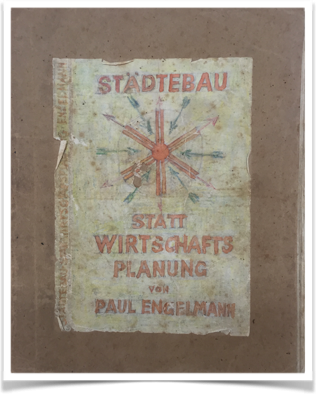
Collections of architects and planners include holdings from various settings. The Historical Archives of the University of Jerusalem hold the collections of German-Jewish planners Ariel Kahane (Berlin 1907-Jerusalem 1986) and Shalom Reichman (Warms 1935- Jerusalem 1992). Ariel Kahane was a senior state planner during early statehood, who played a key role in shaping the Israeli New Towns programme. Professor Shalom Reichman, a Professor of Geography at the Hebrew University, was a pioneer of Israeli geography and planning.
The archive at the Architecture Department of the Technion holds collections of German-Jewish architects and planners Paul Engelmann (Olomouc 1891 - Tel Aviv 1965), Gedalyau Wilbushevitz (Grodno 1865 - Palestine 1943) and Max Lev (Loeb) (Kassel 1901 - Haifa 1962). Paul Engelmann, arguably Adolf Loos’ closest pupil, was educated in Vienna and close to modernist circles, including Ludwig Wittgenstein and Karl Kraus. His small, yet incredibly rich, archive at the Technion is evidence of his close apprenticeship with Adolf Loos and his attempts to promote Loos’ legacy in Palestine after emigration in 1934. Wilbushevitz received his education at the TU Berlin-Charlottenburg and after emigration planned major public landmarks in the city of Haifa. The drafts, sketches and personal documents of Max Lev (Loeb) document his careers in Darmstadt, Cologne and then in Haifa. Largely, these collection further illuminate the contribution of German-Jewish modernist architects and planners to early nation building efforts in the fields of architecture, town and country planning.
Location: The Historical Archives of the Hebrew University of Jerusalem
Arranged & described by: Shaul Marmari
Further information: Finding Aid
The personnel files (5 folders) of the philosopher Shmuel Hugo Bergmann (Prague 1883 – Jerusalem 1975) contain letters and documents related to Bergmann’s professorship at the Hebrew University of Jerusalem. From 1920-1935, Bergmann served as director of the Jewish National and University Library (now National Library of Israel). He was professor of philosophy at the Hebrew University and its first rector. Bergmann’s research was devoted to Kant, Maimonides, and 20th century philosophy. Furthermore, he was one of the yishuv's leading public intellectuals. The archival materials provide insight into Bergmann’s academic career and his involvement in policy matters of the university.
Personal archives and collections were rescued from Nazi Germany by emigrants, refugees, and Jewish institutions with considerable difficulty during the years 1933-1945 and in the immediate aftermath of the Holocaust. Many of these collections were brought to Mandate Palestine and are now preserved in public archives or private collections in Israel. Despite the efforts of Israeli archives, a significant part of the rescued materials has not yet been made available to international research. Few Israeli archives can provide personnel with sufficient language skills to make these mostly German-language holdings accessible.
The project Traces of German-Jewish History promotes the arrangement and description of archives of scholars, writers, and artists and encourages archive-based research in the fields of Cultural Transfer, the History of Science, the Migration of Knowledge, and the History of Ideas. In order to preserve significant collections and to open them up to international research, the project draws on the DLA’s development of flexible cataloging and conservation measures, while the Rosenzweig Minerva Research Center offers its scholarly expertise and a forum for discussions between established scholars, junior researchers, and archivists.
Personal archives, literary estates, and historical collections do not only represent a threatened "cultural heritage", but they also provide an essential foundation for new cultural and scholarly discussions. Traces of German-Jewish Historyoffers junior scholars and students the opportunity to participate in projects combining academic research and archival practice. In addition to this, the project aims at locating relevant German-Jewish collections, which are neither archived nor accessible to the public, in order to facilitate their transfer to a suitable public archive in Israel.
The project’s advisory committee includes Dr. Stefan Litt (The National Library of Israel), Dr. Yaacov Lozowick (Israel State Archives), Prof. Guy Miron (Schechter Institute Jerusalem), and Dr. Anja Siegemund (Leo Baeck Institute Jerusalem). It is funded by the German Federal Foreign Office.
See the left menu for the description of the ongoing projects as well as the ones already concluded.
Location: National Library of Israel, Jerusalem
Arranged & described by: Dr. Judith Poppe
Further information: NLI online catalogue
The papers of the poet Netti Boleslav (Jungbunzlau/Mladá Boleslav 1923 – Tel Aviv 1981) consist of letters, diaries, manuscripts and personal documents, which shed light into Boleslav’s writing. The collection includes letters from Boleslav’s parents in Prague (1930s – 1941) and various materials on her lecture-tours in Germany in the 1960s and 1970s as well as several drafts/fragments of an autobiographical novel, which she never completed. The material is particularly significant insofar as it provides important insight into the work of a German-language writer in British Mandate Palestine/Israel.
Location: National Library of Israel, Jerusalem
Detailed description by: Dr. Amalia Kedem
Further information: NLI Online Catalogue
The collection contains musical scores, documents, photos, letters, manuscripts, and news-paper clippings of Chemjo Vinaver (1895–1973), a choir conductor, researcher (esp. Hasidic music), and coordinator of music for choir. Vinaver was married to Mascha Kaléko; he studied and worked in Berlin until his emigration from Nazi-Germany in 1938. The collection documents Vinaver’s work in Germany, the USA, and Israel; in particular, it provides an insight into his composing and into research related to his elaborate Anthology of Jewish Music (1955).
Location: National Library of Israel, Jerusalem
Arranged & described by: Dr. Hanan Harif, Tom Fogel
Further information: NLI online catalogue (now partly available)
The NLI holds ca. 30 boxes of the papers of Shlomo Dov Goitein (Burgkunstadt 1900 – Princeton 1985), one of the leading Orientalists and Medievalists of the 20th century who received his academic training in Frankfurt. The papers include correspondence, manuscripts, notes, private diaries, travel literature and ethnographic reports. Goitein taught at the Hebrew University of Jerusalem and at the University of Pennsylvania. In 1971, he became a member of the Institute for Advanced Studies in Princeton. Goitein’s scope of scholarship ranged from early Islamic history and theology, Arab-Jewish literature and Medieval Jewish history to the history and culture of Yemenite Jewry. His pioneering research on the ‘Cairo Geniza’ is reflected in the six volumes of Mediterranean Society (1967 and 1983).
Location: Israeli Documentation Center for the Performing Arts, Tel Aviv
Arranged and described by: Jan Kühne
Further information: Israeli Documentation Center for the Performing Arts
The archive contains the historical records of the Habima Secretariat in Berlin 1928–1933 – mainly letters, legal documents, contracts, and bills in German (bulk), Hebrew, Polish, Yiddish, Russian, English, and French. The Hebrew theatre Habima (est. in Moscow 1918) became the National Theatre of Israel in 1948. Most materials pertain to the legal philanthropic bodies, Habima Friends’ Circle and the Patrons’ Organization.
Location: Central Archives for the History of the Jewish People (CAHJP), Jerusalem
Arranged & described by: Sonja Dickow
Further information: CAHJP Finding Aid
The collection – mainly letters, manuscripts, personal documents, published works, books and photographs – covers a time span from 1881 until 2013 and reveals new perspectives on the life and work of C. Z. (Hans) Kloetzel (1891–1951) in Berlin and Jerusalem as well as information about members of his family before and after the rise of National Socialism in Germany.
Location: The Leo Baeck Institute Jerusalem (LBI)
Cataloguing: Judith Siepmann
Further Information: Online catalogue of the Center for Jewish History, New York
The LBI archives hold three types of collections: autobiographical material of German-Jewish immigrants and their families (main portion of archive); private collections of entrepreneurs and intellectuals; LBI institutional records that document the history of the Institute and the incipient and ongoing collaborative efforts with German institutions and scholars. The institutional records pertain among others to the Council of Jews from Germany and to founding members of the LBI like Shmuel Hugo Bergman, Martin Buber, Gershom Scholem, Ernst Simon and Jacob Katz. Electronic descriptions of more than 100 core-collections are now available online.
Location: Archives for the History of Tel Aviv University, Tel Aviv
Arranged & described by: Netta Cohen, Ray Schrire and Itamar Manoff
Further Information: Finding Aid
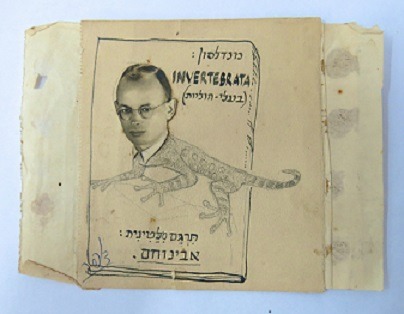
The papers of Prof. Heinrich Mendelssohn (1910–2002), a renowned zoologist and a pioneer of environmental thought & action in Israel, comprise more than 70 archival boxes of manuscripts, observations on Israel’s changing nature, research materials and notes, correspondence with academic, governmental and non-governmental institutions in Israel and abroad as well as images, films, and objects.
Location: Sha'ar Zion Library, Beit Ariela, Tel Aviv
Arranged & described by: Dr. Lina Barouch and Judith Siepmann
Assistance: Tanya Zhovner, Frank Schloeffel, Maja Krueger
Further information: Finding Aid
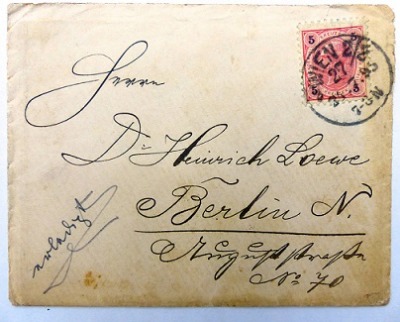
50 boxes of letters, manuscripts, notes, rare printed matter, and books of Sha’ar Zion Library’s former director and Zionist writer Heinrich Loewe (1869–1951) document his work as a librarian in Berlin and Tel Aviv. They also reflect his role as journalist, newspaper editor as well as early Zionist networker and scholar of Jewish folklore. Many materials shed light on Loewe’s commitment to the development of libraries in Mandate Palestine.
An article by Judith Siepmann on Heinrich Loewe’s archive has been published in Naharaim.
Location: The National Library of Israel
Arranged & Described by: Amit Levy
Further information: Online catalogue of the NLI (forthcoming)
The German-Jewish Orientalist archives at the National Library of Israel (NLI) allow us to unfold a unique case of knowledge transfer: the transplantation during the 1920s and 1930sof Orientalist ideas, methods and conceptions from Germany to British Mandate Palestine. These archives include the famous Zettel (research notes) of Josef Horovitz (1874 - 1931); correspondence held by his delegate in Jerusalem, Levi Billig (1897–1936); correspondence and research material of David Zvi (Hartwig) Baneth (1893–1973), one of the founding fathers of the School of Oriental Studies established in Jerusalem in 1926; documents from the archive of the Berlin-born Gabriel Baer (1919–1982), a member of the second generation of scholars at the School of Oriental Studies. The materials also shed light on questions of scientific utility and neutrality. One more segment of this archive are documents that belonged to Eugen Mittwoch (1876–1942), a prominent Jewish Orientalist who shaped 20th-century Orientalism in Germany, and who was the head of the NfO (Nachrichtenstelle für den Orient), an office that focused on publishing pro-German propaganda in Muslim countries during World War I.
Location: Leo Baeck Institute Jerusalem
Arranged & described by: Dr. Enrico Lucca
Further information: LBI Jerusalem Finding Aid (soon available); LBI New York Online Catalogue
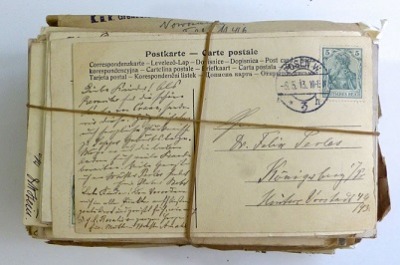
The collection contains correspondence, manuscripts of scholarly works and sermons, notes and newspaper clippings of Rabbi Joseph Perles (1835–1894) and his son, the Rabbi and scholar Felix Perles (1874–1933). The papers provide an insight into less known facets of the history and networks of the Wissenschaft des Judentums; the materials in Jerusalem complement a corresponding collection at the Leo Baeck Institute New York.
Location: National Library of Israel (NLI), Jerusalem
Arranged & described by: Amit Levy
Further information: NLI online catalogue
The papers of the prominent Jewish-German orientalist Martin Plessner (Posen/Poznań 1900 – Jerusalem 1973) consist of manuscripts, research-related records and personal notes as well as correspondence with colleagues in Israel and abroad. Plessner, an important figure in the study of Islam and Arabic in Israel, worked as an assistant of the orientalist Helmut Ritter at the University of Hamburg and as lecturer at the University of Frankfurt until 1933. He joined the Department of Islamic Culture at the Hebrew University of Jerusalem in 1955. The collection is a substantial source for the study of German-Jewish Orientalism in Israel and migration-related knowledge transfer.
Location: Central Zionist Archives, Jerusalem
Arranged & described by: Margarita Fortus
Further information: Central Zionist Archives
In 2012, the daugther of Nadia Stein (1891–1961), Zionist and activist in the social sphere, agreed to transfer manuscripts, diaries, family correspondence, and images to the CZA. They complement a collection of professional correspondence, articles, and propaganda material (especially on the Women’s International Zionist Organization), which had been donated to the CZA earlier. The papers of Nadia Stein offer rich material for gender-orientated research on Zionism and Zionist women's activities in the field of social work.
Location: The National Library of Israel
Arranged & Described by: Merav Reuveni, Elena Müller
Further information: Online catalogue of the NLI (forthcoming)
The expansive collection of papers (24 boxes) of pioneer Israeli zoologist and marine biologist Heinz Steinitz (Breslau 1909 – Jerusalem 1971) provides a unique insight into the founding years of marine research in Israel, promoted by researchers such as Heinz Steinitz and colleague Heinrich Mendelssohn. The collection contains both evidence of Steinitz’s student years in Berlin and then in Jerusalem after his emigration in 1933, as well as vast correspondence with institutions and researchers in Israel and worldwide in the fields of zoology and marine biology, documentation of research trips to remote maritime locations, and ecological projects in Israel pertaining to the Gulf of Eilat and the unique Chula Valley in northern Israel.
Location: The National Library of Israel
Arranged & Described by: Dr. Silja Behre, Lisa Sophie Gebhard, Liad Levy-Mousan, Elena Müller
Further information: Online catalogue of the NLI (forthcoming)
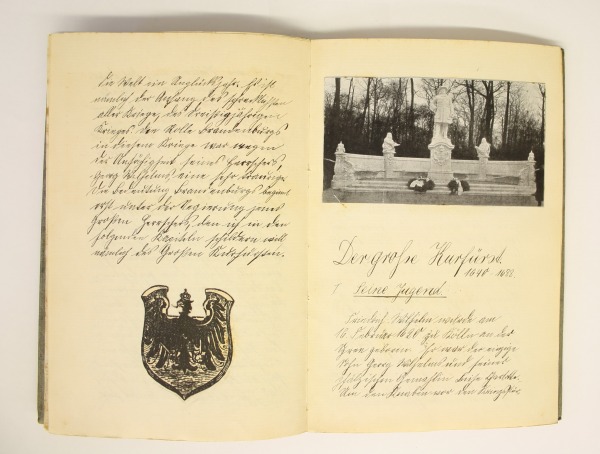
Curt Wormann (Berlin 1900 – Jerusalem 1991) was the head of the Jewish National and University Library in Jerusalem between 1947 and 1968. His vast collection (37 boxes) of correspondence, administrative documents, personal papers and manuscripts sheds crucial light on the history of Israeli state formation and institution building, most notably the Hebrew University of Jerusalem and the National Library. It illuminates critical moments from the declaration of statehood (1948), the following war and transplantation of the academic campus to Givat Ram, up to the return to the original campus site in the immediate years following the 1967 War. The collection also holds papers documenting Wormann’s school years in Germany prior to emigration to Mandate Palestine in 1934 and his release from office as a teacher and librarian under the Nazi Law for The Restauration of Professional Civil Service.

Events
Traces and Treasures: Preserving and Exploring German-Jewish Collections in Israeli Archives, international conference at the Hebrew University, 23-24 June 2013.
בארכיון ובשדה: מבט היסטורי על תכנון ירושלים וישראל, ערב עיון לכבוד חשיפת ארכיוני רייכמן-כהנא, יד יצחק בן-צבי, 5 במרץ 2017 (לחצו כאן לצפייה באירוע המוסרט).
Press and Online Articles
Review of the project by Avner Shapira in Haaretz (2013) [in Hebrew]
German or in German? On the Preservation of Literary and Scholarly Collections in Israel, an article by Prof. Yfaat Weiss published at the Institute for Human Sciences, (2015)
Das Erbe der Einwanderer, a reportage by Lars-Broder Keil at Die Welt (2016)
"Heimat auf dem Balkon: Zur Erschließung deutsch-jüdischer Nachlässe in Israel" by Joachim Schlör, in Jüdische Kultur & Geschichte. Magazin des Simon-Dubnow Instituts (2018)
A Murder in Mandatory Tel Aviv: The Orientalist as an Advocate, by Hanan Harif, in The Israel National Library Blog (2019)
Crossing the Divide: Walter Grab and the East-German Historical Establishment, by Yonatan Shiloh-Dayan, in The Israel National Library Blog (2020)
“Stranger Things” in Jerusalem: Goethe and Goebbels in the Ticho Family Garden, by Dr. Lina Barouch, in The Israel National Library Blog (2020)
Book Diplomacy: Curt Wormann and the International Librarians, by Dr. Silja Behre in The Israel National Library Blog (2020)
An article about Leo Aryeh Mayer That the arrangement of his estate was made as part of the Traces and Treasures project. in Haaretz (2021) [in Hebrew]
Publications
- Silja Behre, Der Bücherdiplomat: Curt Wormanns Nachlass als Quelle für eine globale Bibliotheksgeschichte, Jahrbuch des Dubnow-Instituts / Dubnow Institute Year Boook Volume XVII/2018 (2020)
- Judith Siepmann, Büchergeschichten, Ordnungskonzepte und die Vielschichtigkeit der Erinnerung: Heinrich Loewe und die Sha’ar-Zion-Bibliothek in Tel Aviv, Jahrbuch des Dubnow-Instituts / Dubnow Institute Year Boook Volume XVII/2018 (2020)
- Amit Levy, The Archive as Storyteller: Refractions of German-Jewish Oriental Studies Migration in Personal Archives, Jahrbuch des Dubnow-Instituts / Dubnow Institute Year Boook Volume XVII/2018 (2020)
- Elena Müller, Zoology in Translation: Archiving Heinz Steinitz’ Life in Science, Jahrbuch des Dubnow-Instituts / Dubnow Institute Year Boook Volume XVII/2018 (2020)
- Meirav Reuveny, "The Heinz Steinitz Marine Biology Laboratory in Eilat: Science and Politics between Father and Son", Jahrbuch des Dubnow-Instituts / Dubnow Institute Year Boook Volume XVII/2018 (2020)
- Shelly Zer-Zion, "The Archive of the Habima Secretariat: Margot Klausner and the Making of a National Stage", Jahrbuch des Dubnow-Instituts / Dubnow Institute Year Boook Volume XVII/2018 (2020)
- Shira Wilkof,"City, Utopia, and Migrant Displacement: The Archive of Urban Planner Ariel Kahane", Jahrbuch des Dubnow-Instituts / Dubnow Institute Year Boook Volume XVII/2018 (2020)
- Netta Cohen, "Memories of a Zoologist: Reflections on the Role of the Archive in the Production of Knowledge and Memory", Jahrbuch des Dubnow-Instituts / Dubnow Institute Year Boook Volume XVII/2018 (2020)
- Lina Barouch, "Introduction to -Schwerpunkt the Return to the Archive: Dispersal, Transmission, and Anticipation in Personal Archives Between Germany and Israel", Jahrbuch des Dubnow-Instituts / Dubnow Institute Year Boook Volume XVII/2018 (2020)
- Elisabeth Gallas, Anna Holzer-Kawalko, Caroline Jessen, Yfaat Weiss (EDS.), "Contested Heritage- Jewish Cultural Property after 1945", Leibniz Institute for Jewish History and Culture –Simon Dubnow (2020)
- Shira Wilkof, "An ‘ordinary modernist’? Empire and nation in Ariel Kahane’s large-scale planning", Planning Perspectives (2019)
- Hanan Harif, "Between a Bridge and a Fortress: Shlomo Dov Goitein and the Role of 'Jewish Arabists' in American Academy", Jewish Social Studies (forthcoming)
- Hanan Harif, "Islam in Zion? Yosef Yo'el Rivlin's Translation of the Qur'an and Its Place Within the New Hebrew Culture", Naharaim 10:1 (2016), 39-55
- Hanan Harif, "Between Arab revival and Zionism: Josef Horovitz, Shlomo D. Goitein and the politics of Jewish Oriental studies", in: Ottfried Fraisse and Christian Wiese (eds.), Beyond the Myth of Golden Spain, De Gruyter (2016)
- Caroline Jessen, "Der Kanon im Archiv. Chancen und Herausforderungen für die Bewahrung und Erforschung von Nachlässen deutsch-jüdischer Autoren und Gelehrter in Israel", in: Philine Erni und Caroline Jessen (Hrsg.), Alt-Neue Schriften. Typographische und buchgestalterische Arbeiten von Moshe Spitzer, Franzisca Baruch und Henri Friedlaender, Marbach (2015)
- Caroline Jessen, "Spuren deutsch-jüdischer Geschichte. Erschließung und Erforschung von Nachlässen und Sammlungen in Israel", Archivar. Zeitschrift für Archivwesen 66 (2013), 328-333
- Jan Kühne and Shelly Zer-Zion, "The German Archive of the Hebrew Habima: Bureaucracy and Identity", Naharaim 7:1-2 (2013), 239-260.
- Amit Levy, "A Man of Contention: Martin Plessner and his Encounters with the Orient", Naharaim 10:1 (2016), 79-100
- Yonatan Mendel, "German Orientalism, Arabic Grammar, and the Jewish Education System. The origin and effects of Martin Plessner's Theory of Arabic Grammar", Naharaim 10:1 (2016), 57-77
- Judith Poppe, "Ich dichte in die wüste Zeit. Die deutschsprachige Lyrik Israels als Kleine Zwischenliteratur"
(under review)
- Sebastian Schirrmeister, "Der erste Mamlock. Eine Spurensuche. Das hebräische Bühnenmanuskript von Professor Mamlock im Kontext der verschiedenen Fassungen des Dramas", in: Hermann Haarmann und Christoph Hesse (Hrsg.), Einspruch. Schriftenreihe der Friedrich-Wolf-Gesellschaft, Marburg (2014)
- Judith Siepmann, "Ein Mikrokosmos der deutschsprachigen Emigration. Heinrich Loewe und die Sammlung des Beit Ariela", Naharaim 7:1-2 (2013), 217-238
- Shelly Zer-Zion, Habima. Eine hebräische Bühne in der Weimarer Republik, Paderborn (2016).
- Shelly Zer-Zion und Jahn Künhe, "The German Archive of the Hebrew Habima: Bureaucracy and Identity", Naharaim 7:1-2 (2013), 239-260


